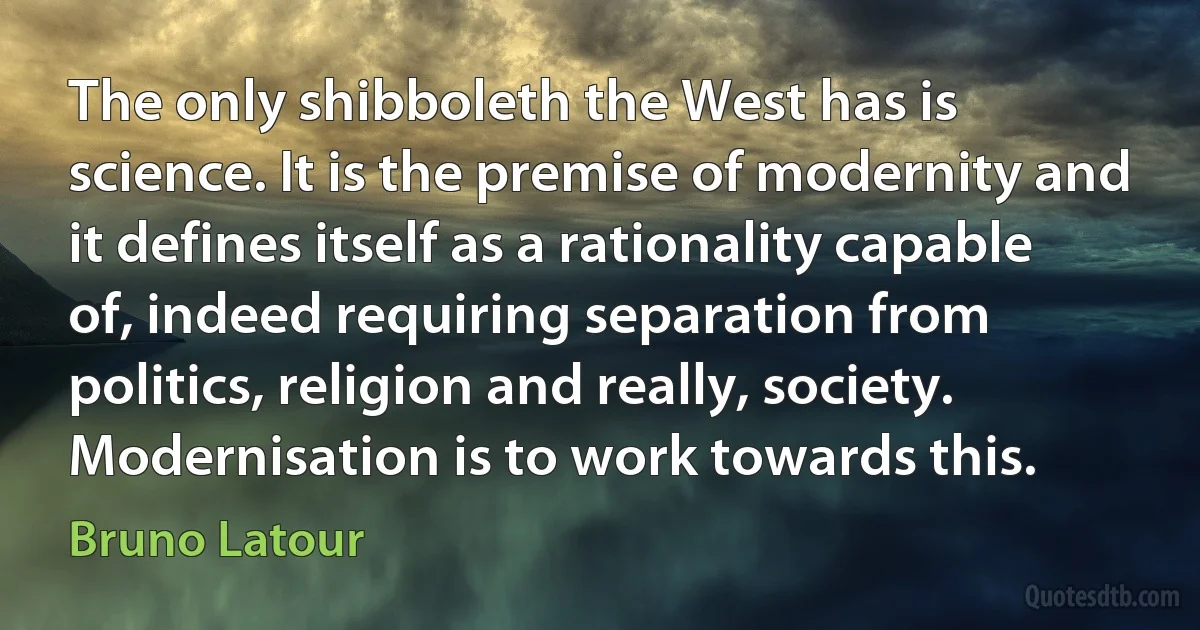Premise Quotes - page 6
What is really disturbing about The Name of the Rose, however, is the underlying belief in the liberating, anti-totalitarain force of laughter, of ironic distance. Our thesis here is almost the exact opposite of the underlying premise of Eco's novel: in contemporary socities, democratic or totalitarian, that cynical distance, laughter, irony, are so to speak, part of the game. The ruling ideology is not meant to be taken seriously or literally. Perhaps the greatest danger for totalitarianism is people who take ideology seriously.

Slavoj Žižek
By the time of his Fourth String Quartet, inversional symmetry had become as fundamental a premise of Bartók's harmonic language as it is of the twelve-tone music of Schoenberg, Berg, and Webern. Neither he nor they ever realized that this connection establishes a profound affinity between them in spite of the stylistic features that so obviously distinguish his music from theirs...Nowhere does he [Bartók] recognize the communality of his harmonic language with that of the twelve-tone composers that is implied in their shared premise of the harmonic equivalence of inversionally symmetrical pitch-class relations.

George Perle
I am not myself free or human until or unless I recognize the freedom and humanity of all my fellowmen.
Only in respecting their human character do I respect my own. ...
I am truly free only when all human beings, men and women, are equally free. The freedom of other men, far from negating or limiting my freedom, is, on the contrary, its necessary premise and confirmation.

Mikhail Bakunin
Arthur Schlesinger, Jr. challenged the underlying premise of prevailing Civil War scholarship. The South, he pointed out, had shown no evidence of a willingness to end slavery; indeed, over time it had become ever more hysterical in its defense. With one eye firmly on the recent past, Schlesinger insisted that a society closed in support of evil could not be appeased, and if it was worth a war to destroy Nazism, surely it was worth one to eradicate slavery. But not until the 1960s, under the impact of the civil rights revolution, did historians en masse repudiate a half-century of Civil War scholarship, concluding that the war resulted from an irreconcilable conflict between two fundamentally different societies, one resting on slavery, the other on free labor. Historians pushed Emancipation to the center of their account of the Civil War, and it has remained there ever since.

Eric Foner
Perhaps you see nothing wrong with believing the theory of evolution, even if it can't be substantiated. But remember - your information will govern your actions... If you believe evolution is true, and from that premise believe that the Bible is false, then you won't repent... If your faith is placed in evolution and not in God's promises, you will find that the object to which you have tied yourself will be your eternal downfall.

Ray Comfort
I absolutely reject the premise there is anything wrong with Black people "talking white”. It is as if to vast swathes of the privileged white left and impoverished Black community diction, education and a mastery of thought is somehow "white”... comrade, how wrong you are to say that after decades in academia I'm acting white. I'm being black. I'm being black everyday a cop pulls my car over for a "routine stop”, I'm being black each time I look in the mirror, and I'm damn well being black when I school young fools out of the myth our race is too ill-evolved to be both black and accomplished.

Elaine Brown
The premise of my whole campaign has been not that people need to believe what I say to them, but they need to look at what I have done. And what I have done in the state of Nevada, I have voted over a 100 times against tax and fee increases, poor public policy, and unconstitutional bills.

Sharron Angle



